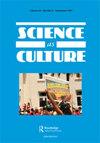无知和基于证据的全球卫生的悖论:印度百万死亡研究中的死亡率统计案例
IF 2.5
3区 哲学
Q1 CULTURAL STUDIES
引用次数: 2
摘要
定量证据和指标在当代全球卫生中发挥着核心作用。例如,死亡率统计数据被认为对改善全球南方国家的健康至关重要。然而,许多观察人士感到遗憾的是,许多低收入和中等收入国家没有可靠的死亡原因数据。印度的百万死亡研究(MDS)旨在解决这一问题,通过将现有的具有代表性的人口统计样本与一种称为口头尸检的创新诊断方法相结合,产生具有代表性的统计数据,试图减少对死亡率的无知。然而,在这项研究中,无知不仅仅是缺乏可靠的死亡率统计数据。关于制度化无知的社会科学观点可以帮助解开基于证据的全球卫生的某些悖论是如何通过MDS中三种不同的无知表达出来的。首先,这项研究同时具有国家和全球的雄心,在一些争论中相互交叉,这些争论将无知作为这项研究的正当理由。第二,在诊断死亡原因时,无知被认为是平衡专业知识需求与偏见风险的工具。第三,MDS研究人员通过声称与改善公共卫生的研究结果的“可操作性”相比,它是相对的,从而消除了对诊断的剩余无知或不确定性。在探索制度化无知的这些不同表现时,MDS作为一个基于证据的全球卫生项目的几个悖论变得显而易见。通过探索这些悖论,本分析表明,对制度化无知的研究可以为有意表达和动员无知如何有助于构成以证据为基础的全球卫生提供新的视角。本文章由计算机程序翻译,如有差异,请以英文原文为准。
Ignorance and the paradoxes of evidence-based global health: the case of mortality statistics in India’s million death study
ABSTRACT Quantitative evidence and metrics play a central role in contemporary global health. Mortality statistics, for example, are considered essential for improving health in the global South. Yet, many observers lament that reliable cause of death data is not available for many low- and middle-income countries. The Million Death Study (MDS) in India forms an effort to address this issue, seeking to reduce ignorance around mortality by generating representative statistics by combining an existing, representative demographic sample with an innovative diagnostic method called verbal autopsy. Yet, ignorance is more than the absence of reliable mortality statistics in this study. Social science perspectives on institutionalized ignorance can help unpack how certain paradoxes of evidence-based global health manifest through three different articulations of ignorance in the MDS. First, the study’s simultaneously national and global ambitions intersect in arguments that present ignorance as legitimation for the study. Second, ignorance is presented as instrumental in balancing the need for expertise with the risk of bias in diagnosing causes of death. Third, MDS researchers dismiss remaining ignorance or uncertainty about diagnoses, by claiming it is relative compared to the ‘actionability’ of study results for improving public health. In exploring these various manifestations of institutionalized ignorance, several paradoxes of the MDS as an evidence-based global health project become visible. By exploring these paradoxes, this analysis suggests that studies of institutionalized ignorance can provide novel perspectives on how deliberate articulations and mobilization of ignorance helps constitute evidence-based global health.
求助全文
通过发布文献求助,成功后即可免费获取论文全文。
去求助
来源期刊

Science As Culture
Multiple-
CiteScore
5.20
自引率
3.80%
发文量
28
期刊介绍:
Our culture is a scientific one, defining what is natural and what is rational. Its values can be seen in what are sought out as facts and made as artefacts, what are designed as processes and products, and what are forged as weapons and filmed as wonders. In our daily experience, power is exercised through expertise, e.g. in science, technology and medicine. Science as Culture explores how all these shape the values which contend for influence over the wider society. Science mediates our cultural experience. It increasingly defines what it is to be a person, through genetics, medicine and information technology. Its values get embodied and naturalized in concepts, techniques, research priorities, gadgets and advertising. Many films, artworks and novels express popular concerns about these developments. In a society where icons of progress are drawn from science, technology and medicine, they are either celebrated or demonised. Often their progress is feared as ’unnatural’, while their critics are labelled ’irrational’. Public concerns are rebuffed by ostensibly value-neutral experts and positivist polemics. Yet the culture of science is open to study like any other culture. Cultural studies analyses the role of expertise throughout society. Many journals address the history, philosophy and social studies of science, its popularisation, and the public understanding of society.
 求助内容:
求助内容: 应助结果提醒方式:
应助结果提醒方式:


